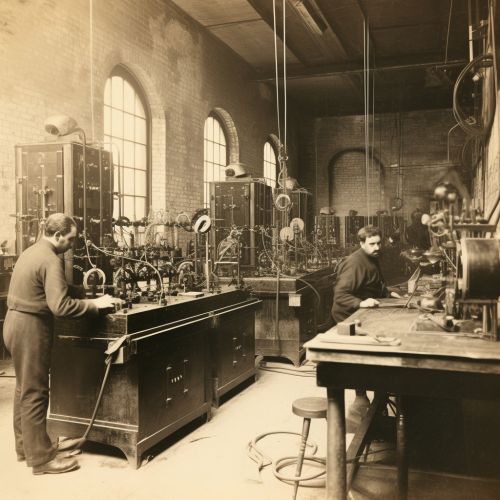Electrical engineering
Overview
Electrical engineering is a field of engineering that deals with the study and application of electricity, electronics, and electromagnetism. This discipline covers a range of subtopics including power, electronics, control systems, signal processing and telecommunications. Electrical engineering may or may not encompass electronic engineering.
History
The field of electrical engineering was established in the late 19th century, and over the past century, it has evolved into a broad discipline that includes several specialized sub-disciplines. The inception of electrical engineering is considered to have occurred in 1882, with the establishment of the first electrical engineering department at University College London, England. The field has since expanded to include electronics, digital computers, power engineering, telecommunications, control systems, radio-frequency engineering, signal processing, instrumentation, and microelectronics.


Sub-disciplines
Electrical engineering is divided into a range of fields including, power engineering, control engineering, electronic engineering, microelectronics, signal processing, telecommunications engineering, and instrumentation engineering.
Power Engineering
Power engineering deals with the generation, transmission and distribution of electricity as well as the design of a range of related devices. These include transformers, electric generators, electric motors, high voltage engineering, and power electronics. In many regions of the world, governments maintain an electrical network called a power grid that connects a variety of generators together with users of their energy. Power engineers may work on the design and maintenance of the power grid as well as the power systems that reside within it.
Control Engineering
Control engineering focuses on the modeling of a diverse range of dynamic systems and the design of controllers that will cause these systems to behave in the desired manner. To implement such controllers, electrical engineers may use electronic circuits, digital signal processors, microcontrollers, and programmable logic controllers (PLCs). Control engineering has a wide range of applications from the flight and propulsion systems of commercial airplanes to the cruise control present in many modern cars.
Electronic Engineering
Electronic engineering involves the design and testing of electronic circuits that use the properties of components such as resistors, capacitors, inductors, diodes, and transistors to achieve a particular functionality. The tuned circuit, which allows the user of a radio to filter out all but a single station, is just one example of such a circuit.
Microelectronics
Microelectronics engineering deals with the design and microfabrication of very small electronic circuit components for use in an integrated circuit or sometimes for use on their own as a general electronic component. The most common microelectronic components are semiconductor transistors, although all main electronic components (resistors, capacitors etc.) can be created at a microscopic level.
Signal Processing
Signal processing deals with the analysis and manipulation of signals. Signals can be either analog, in which case the signal varies continuously, or digital, in which case the signal varies according to a series of discrete values. Control engineering and telecommunications are two other fields that heavily rely on signal processing.
Telecommunications Engineering
Telecommunications engineering focuses on the transmission of information across a channel such as a coax cable, optical fiber or free space. Transmissions across free space require information to be encoded in a carrier signal to shift the information to a carrier frequency suitable for transmission, this is known as modulation. Popular analog modulation techniques include amplitude modulation and frequency modulation. The choice of modulation affects the cost and performance of a system and these two factors must be balanced carefully by the engineer.
Instrumentation Engineering
Instrumentation engineering deals with the design of devices to measure physical quantities such as pressure, flow, and temperature. These devices are known as instrumentation.
Education and Training
Electrical engineers typically hold a degree in electrical engineering or electronic engineering. Practising engineers may have professional certification and be members of a professional body or an international standards organization. These include the Institute of Electrical and Electronics Engineers (IEEE) and the Institution of Engineering and Technology (IET).
See Also
Electronics Engineering Power Engineering Control Systems Engineering
